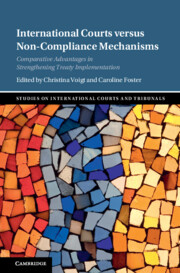53 results
Part III - Trade, Finance and Investment
-
- Book:
- International Courts versus Non-Compliance Mechanisms
- Published online:
- 15 February 2024
- Print publication:
- 22 February 2024, pp 169-236
-
- Chapter
-
- You have access
- Open access
- HTML
- Export citation
1 - Non-Compliance Mechanisms or International Courts: How to Increase Treaty Compliance?
- from Introduction
-
-
- Book:
- International Courts versus Non-Compliance Mechanisms
- Published online:
- 15 February 2024
- Print publication:
- 22 February 2024, pp 3-12
-
- Chapter
-
- You have access
- Open access
- HTML
- Export citation
Part II - Specific Procedures
-
- Book:
- International Courts versus Non-Compliance Mechanisms
- Published online:
- 15 February 2024
- Print publication:
- 22 February 2024, pp 97-168
-
- Chapter
-
- You have access
- Open access
- HTML
- Export citation
Part IV - Environment
-
- Book:
- International Courts versus Non-Compliance Mechanisms
- Published online:
- 15 February 2024
- Print publication:
- 22 February 2024, pp 237-284
-
- Chapter
-
- You have access
- Open access
- HTML
- Export citation
Part VII - Cultural Heritage Law and Law of the Sea
-
- Book:
- International Courts versus Non-Compliance Mechanisms
- Published online:
- 15 February 2024
- Print publication:
- 22 February 2024, pp 443-488
-
- Chapter
-
- You have access
- Open access
- HTML
- Export citation
Contributors
-
- Book:
- International Courts versus Non-Compliance Mechanisms
- Published online:
- 15 February 2024
- Print publication:
- 22 February 2024, pp x-xviii
-
- Chapter
-
- You have access
- Open access
- HTML
- Export citation
Part V - Human Rights
-
- Book:
- International Courts versus Non-Compliance Mechanisms
- Published online:
- 15 February 2024
- Print publication:
- 22 February 2024, pp 285-382
-
- Chapter
-
- You have access
- Open access
- HTML
- Export citation
Index
-
- Book:
- International Courts versus Non-Compliance Mechanisms
- Published online:
- 15 February 2024
- Print publication:
- 22 February 2024, pp 489-508
-
- Chapter
-
- You have access
- Open access
- HTML
- Export citation
Introduction
-
- Book:
- International Courts versus Non-Compliance Mechanisms
- Published online:
- 15 February 2024
- Print publication:
- 22 February 2024, pp 1-12
-
- Chapter
-
- You have access
- Open access
- HTML
- Export citation
Contents
-
- Book:
- International Courts versus Non-Compliance Mechanisms
- Published online:
- 15 February 2024
- Print publication:
- 22 February 2024, pp vii-ix
-
- Chapter
-
- You have access
- Open access
- HTML
- Export citation
Part VI - Criminal Law and Disarmament Law
-
- Book:
- International Courts versus Non-Compliance Mechanisms
- Published online:
- 15 February 2024
- Print publication:
- 22 February 2024, pp 383-442
-
- Chapter
-
- You have access
- Open access
- HTML
- Export citation
Foreword
-
- Book:
- International Courts versus Non-Compliance Mechanisms
- Published online:
- 15 February 2024
- Print publication:
- 22 February 2024, pp xix-xx
-
- Chapter
-
- You have access
- Open access
- HTML
- Export citation
Part I - General and Conceptual Issues
-
- Book:
- International Courts versus Non-Compliance Mechanisms
- Published online:
- 15 February 2024
- Print publication:
- 22 February 2024, pp 13-96
-
- Chapter
-
- You have access
- Open access
- HTML
- Export citation
Copyright page
-
- Book:
- International Courts versus Non-Compliance Mechanisms
- Published online:
- 15 February 2024
- Print publication:
- 22 February 2024, pp vi-vi
-
- Chapter
-
- You have access
- Open access
- HTML
- Export citation

International Courts versus Non-Compliance Mechanisms
- Comparative Advantages in Strengthening Treaty Implementation
-
- Published online:
- 15 February 2024
- Print publication:
- 22 February 2024
-
- Book
-
- You have access
- Open access
- Export citation
2 - Oceans and Climate Change
- from Part II - Tackling Multiple Pressures on the Oceans
-
-
- Book:
- The Environmental Rule of Law for Oceans
- Published online:
- 21 February 2023
- Print publication:
- 20 April 2023, pp 17-30
-
- Chapter
-
- You have access
- Open access
- HTML
- Export citation
Ten new insights in climate science 2020 – a horizon scan
-
- Journal:
- Global Sustainability / Volume 4 / 2021
- Published online by Cambridge University Press:
- 27 January 2021, e5
-
- Article
-
- You have access
- Open access
- HTML
- Export citation
Introduction to the Symposium on Jacqueline Peel & Jolene Lin, “Transnational Climate Litigation: The Contribution of the Global South”
- Part of
-
- Journal:
- AJIL Unbound / Volume 114 / 2020
- Published online by Cambridge University Press:
- 03 February 2020, pp. 35-39
-
- Article
-
- You have access
- Open access
- HTML
- Export citation
Part I - Procedural Legitimacy of Judicial Environmental Practice: Access to Justice
-
- Book:
- International Judicial Practice on the Environment
- Published online:
- 15 April 2019
- Print publication:
- 18 April 2019, pp 23-118
-
- Chapter
- Export citation
Part II - Legitimacy and Scientific Certainty: Environmental Adjudication, Use of Experts and the Limits of Science
-
- Book:
- International Judicial Practice on the Environment
- Published online:
- 15 April 2019
- Print publication:
- 18 April 2019, pp 119-164
-
- Chapter
- Export citation

